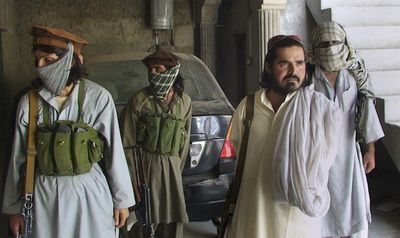Taliban leader’s rival killed
Death might be a setback for Pakistan government

ISLAMABAD, Pakistan – The assassination of a key rival of top Taliban leader Baitullah Mehsud, Pakistan’s public enemy No. 1, could set back the government’s bid to divide and conquer the militant group’s leadership, analysts said Tuesday.
Qari Zainuddin was shot while taking a morning nap – allegedly by his own bodyguard, Gulbadin Mehsud, who is not related to Baitullah Mehsud – just after morning prayers. Zainuddin, who gained recent attention by speaking out strongly against Mehsud and his tactics, was rushed to a hospital about 7 a.m. but died a short time later.
Baitullah Mehsud, who is linked to al-Qaida, has been blamed for several bombings – including the 2007 assassination of former Prime Minister Benazir Bhutto, for which he denied responsibility – and has been credited with building a production line of suicide bombers he can deploy at will.
The news dealt a blow to a government now ramping up to attack Mehsud’s base in South Waziristan near the Afghan border, a tribal region where alliances shift rapidly and many act on the principle that the enemy of my enemy is my friend.
In a related development Tuesday, U.S. unmanned aircraft reportedly fired three missiles at Mehsud strongholds in South Waziristan, killing several dozen people and wounding as many as 60. The restricted area is isolated and dangerous, making it difficult to verify the reports independently.
Tribesman and militants reportedly fired back but didn’t manage to bring down any of the drones.
By some accounts, several of those killed in one of Tuesday’s attacks were returning from a funeral of a colleague killed in an earlier drone attack.
Pakistani aircraft also attacked a compound in South Waziristan on Tuesday where a large number of militants were meeting.
Zainuddin, the slain Taliban leader, might have been preparing to challenge Pakistan’s pre-eminent Taliban leader politically or militarily. His recent verbal blast against Mehsud, whom he criticized as working for “foreign elements,” prompted speculation that he was acting at the urging of Pakistani authorities.
In a part of the world where tribal politics are often fluid and marked by intrigue, Zainuddin was allied with Mehsud’s predecessor. When that tribal leader was killed, paving the way for Mehsud’s ascent, Zainuddin became angry and split off, taking several hundred militants with him.
Zainuddin then called on Mehsud’s followers to defect and join his side. Followers believe it was one of these supposed defectors who killed Zainuddin.
Analysts said the assassination could make opponents of Mehsud reluctant to ally with the government for fear that authorities won’t be able to protect them. It also could add to Mehsud’s reputation for ruthlessness and for his ability to reach enemies even when they’re well protected.
“In a way, it’s a setback,” said Talat Masood, an independent analyst and former general in the Pakistan army. “It may prevent others from coming forth.”
Pakistani Interior Minister Rehman Malik announced that an investigation was under way that would include a look at whether personal enmity was a factor in the slaying. “Whoever is helping the government is being threatened by terrorists,” he told reporters. But “the public is not afraid anymore and such sacrifices will be made.”